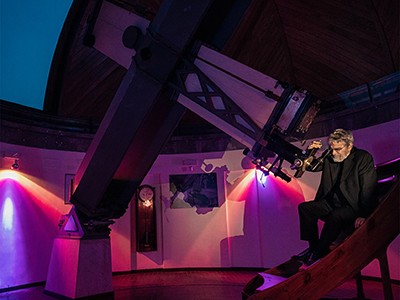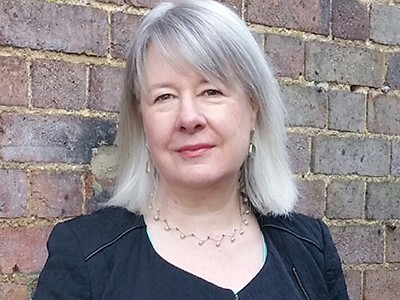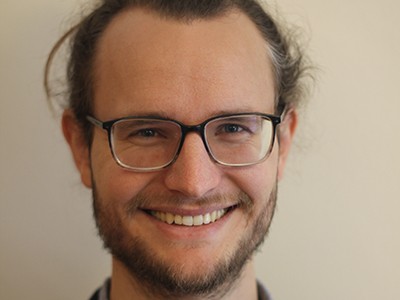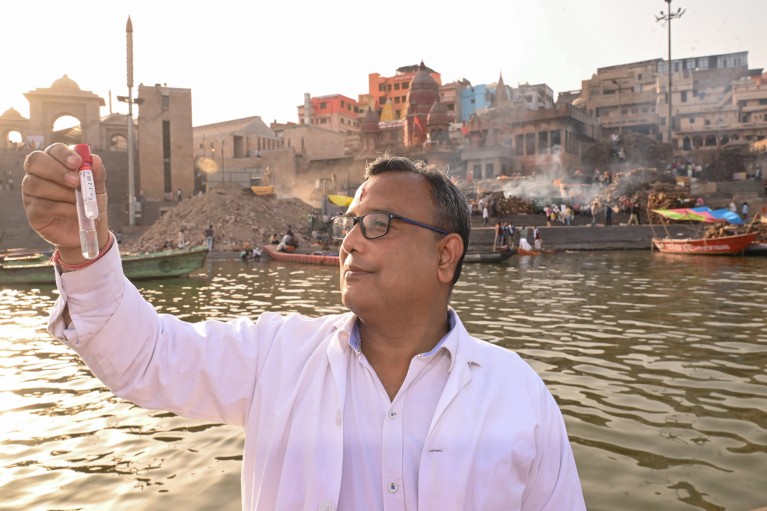
In Varanasi, India, biotechnologist Anurag Chaurasia collects water samples from the River Ganges, which is sacred to Hindus.Credit score: Shri Kashi Vishwanath Baba
For the previous 20 years, Elaine Howard Ecklund has studied scientists’ attitudes in the direction of faith. What she’s discovered, by means of greater than 40,000 surveys and almost 2,500 confidential interviews, is that there are extra spiritual scientists than many individuals would count on. In a single research, not less than 30% of respondents declared a spiritual affiliation (E. H. Ecklund et al. Socius https://doi.org/mvrv; 2016).This research surveyed scientists from eight nations and areas, together with the UK, India, Hong Kong, Turkey and the USA. Globally, round 85% of the inhabitants identifies as spiritual (see go.nature.com/3yatbk5). Ecklund’s analysis has additionally discovered that scientists should not all the time open about their religion at work or in training settings. “I feel there’s the notion generally that different scientists received’t take you critically when you discuss your religion,” says Ecklund, a sociologist based mostly at Rice College in Houston, Texas.
Confidentiality, says Ecklund, allowed the scientists she surveyed to be extra open about their religion than they may in any other case have been. “They have been nearly ready to speak about it,” she says. “They really feel like there’s a lot silence throughout the scientific group about faith — it felt considerably of a aid to speak about their very own strategy to faith in a secure surroundings.”
Ecklund has additionally discovered that many scientists are fairly open to their colleagues’ beliefs. “Atheist scientists are a lot much less destructive about faith than we may be led to consider by the loudest voices, which we frequently assume are probably the most quite a few ones. And that’s usually not the case,” she says. For instance, her 2016 research discovered that in the USA, two-thirds of scientists don’t view the science–faith relationship as one among battle.
Serving science and the Church because the Pope’s astronomer
Ecklund has discovered that attitudes to religion within the office fluctuate by nation. For instance, she says, “Indian scientists assume that there’ll be extra dialogue of faith inside scientific contexts. So, there’s generally blessings over experiments. There may be an assumption that workers in a lab will need to have day off for religious and non secular holidays.”
Nature spoke to 5 spiritual scientists about how they navigate religion at work. Their experiences differ, however none felt a battle between their beliefs and their science. Though none had skilled any direct discrimination on the premise of their faith, some did admit to being much less open about their religion specifically skilled contexts.
Many say that science and faith work in concord as methods of understanding the world. Anurag Chaurasia, a biotechnologist with the Indian Council of Agricultural Analysis in Varanasi, recollects how, as a graduate pupil, he and his classmates would comply with the guiding ideas of the Hindu textual content the Bhagavad Gita to assist them discover course. When experiments went awry, for instance, their professor would instruct them: “Learn the primary message of this guide, ‘Do your obligation with out being connected to the fruits of your motion; do your obligation selflessly.’” This steerage, says Chaurasia, taught him and his colleagues perseverance and the best way to deal with failure. Bhagavad Gita ideas additionally formed group yoga classes to help rest and assist good psychological well being, and introduced them collectively as a group.
Re-examination
Mikaela Lee, a technical teacher in biomedical sciences at Solent College in Southampton, UK, says that her robust Christian religion informs her world view. “The best way I strategy science, personally, is as a technique to glorify God and discover out extra about his creation,” she provides.
Raised in California as an evangelical Christian, Lee skilled how a extra conservative set of beliefs might be in battle with science. “I grew up believing in creationism, that God created the world. Evolution was sort of like a grimy phrase in my church,” she says. “However I additionally believed that we, as human beings, had nearly an obligation to check the pure world and uncover issues about it, particularly for medical analysis. And as I obtained older, I made a decision that you simply couldn’t take bits and items: you both needed to settle for the entire science or none of it.” This led her to regulate her spiritual beliefs to accommodate scientific proof.
“The proof that I noticed was fairly convincing. Once we studied evolution in class, it sort of clicked in my mind. And it doesn’t simply make sense. It’s lovely. It’s elegant. That was the tipping level for me.” Lee discovered herself re-examining most of the conservative beliefs that she’d been taught rising up. After shifting to the UK for college in 2018, she joined the extra liberal United Reformed Church, which, she says, has many scientist members.
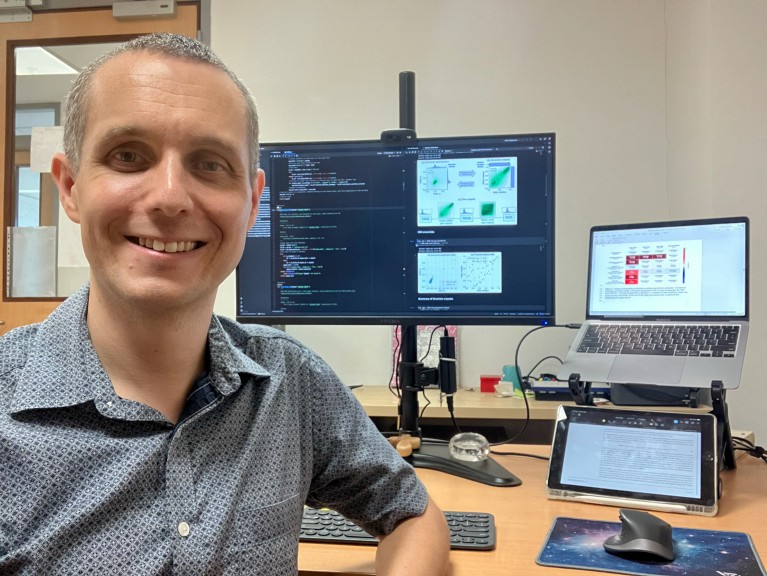
Local weather scientist Benjamin Grandey has been in a position to have conversations about his spiritual religion at work due to an open office tradition.Credit score: Benjamin Stephen Grandey
For local weather scientist Benjamin Grandey, who relies in Singapore, his Christian religion informs his science: “My theology helps me to understand the worth of why science works, as a result of I consider in a God who has made a really ordered Universe, and that he has given us, as human beings, the power to grasp lots about that Universe.” For instance, Grandey factors out that arithmetic, a human assemble, is “so good at offering instruments to explain bodily phenomena on the planet past our minds”.
Assumed atheism
Sociologist Christopher Scheitle surveyed greater than 1,300 graduate college students about their experiences and their attitudes to faith. He discovered that many non secular folks finding out science battle to be open about their religion, reporting a tradition of ‘assumed atheism’ that usually led them to hide their faith for concern of being judged or discriminated in opposition to (see go.nature.com/4brey69). “I keep in mind having a number of conversations with college students who have been very considerate about hiding the truth that they have been spiritual,” says Scheitle, who relies at West Virginia College in Morgantown. One mentioned that she purposely averted revealing her spiritual beliefs till she had established herself as a scientist. “Her concern was that if folks knew early within the programme, she would instantly be labelled as ‘not a severe scientist’.”
Faith and science can have a real dialogue
Their fears have been comprehensible, as a result of the tradition of assumed atheism meant that different college students and professors felt they might converse dismissively about faith, Scheitle says. “Amongst college students who’re extra spiritual, it’s a pretty widespread expertise that they hear offhand destructive or stereotypical feedback about faith or spiritual folks,” he provides, both within the classroom or within the laboratory or departmental workplaces.
As Scheitle notes in his 2023 guide The Devoted Scientist, when folks conceal part of their id, it may be isolating. “Analysis has discovered that this concealment itself usually finally ends up being dangerous to their very own psychological well-being and to their sense of connection to others,” he writes.
Some graduate college students that Scheitle spoke to have established their very own communities, who meet for prayer and discussions on religion. Those that have been open about their religion admitted having awkward interactions with their non-religious friends. “You possibly can inform [that some co-workers] get uncomfortable, and so they change the topic,” mentioned one chemistry pupil. “It’s not one thing that’s deterred me from being who I’m, however I hate the awkward interactions.”
Suzanne Kalka is open about her Pentecostal religion and has labored with organizations that promote concord between science and faith in her function as a science educator based mostly in Manchester, UK. Certainly one of these organizations is God and the Huge Bang, which runs college workshops to encourage college students to debate the compatibility of science and religion. However in her earlier profession as a science instructor, Kalka says that she felt much less free to debate her faith. She taught primarily in secular faculties, and, particularly in her early profession, felt a must show herself, deciding to not put her function in danger by singling herself out by means of her spiritual beliefs. “It’s robust, since you’re dwelling two lives — you don’t need to threat your scientific credibility by being brazenly spiritual. I didn’t put on any sort of outward indicators of any spiritual perception. I lived a really compartmentalized life. I wished to be seen to be a really competent instructor of science.”
Folks of religion are allies to stall local weather change
In the direction of the top of her educating profession, Kalka determined that she wished to be extra forthright about her religion. She took a task in a Church of England college and located that she might be extra open. “However even there,” she added, “it was a minority of science academics who had any spiritual perception in any respect, and it was by no means mentioned.”
Kalka thinks that science academics who’re spiritual nonetheless discover it tough to be open about their beliefs. Her recommendation to them is to supply examples of well-known scientists who mixed a lifetime of religion with their scientific achievements. She cites information exhibiting that 75% of scientists who received a Nobel prize between 1901 and 2000 have been of Judaeo-Christian religion (B. A. Shalev 100 Years of Nobel Prizes; 2002).
An accepting tradition
Faadiel Essop says that rising up in apartheid South Africa made him assume extra broadly about issues. Within the Nineteen Nineties, his nation rejected its historical past of government-sanctioned racial segregation, and he thinks that this has led to a extra delicate, tolerant society, wherein he feels in a position to specific his Muslim religion and id. “There’s quite a lot of house so that you can specific your self basically in society.”
A medical physiologist at Stellenbosch College in Cape City, South Africa, and the director of the college’s Centre for Cardio-metabolic Analysis in Africa, Essop says there’s a powerful tradition of acceptance and a willingness to make lodging for spiritual practices, each at Stellenbosch and throughout Africa extra typically. Essop travels throughout the continent often for scientific conferences and says that he’s seen each Muslims and Christians being “fairly snug to specific their faith”.
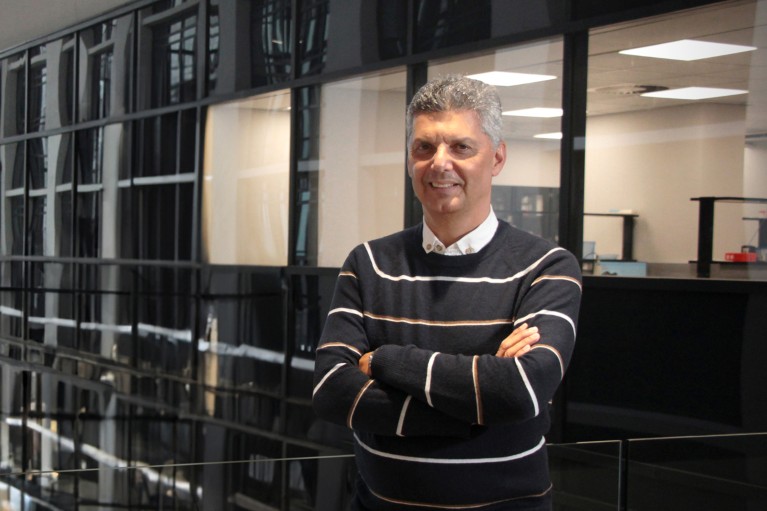
Faadiel Essop says there’s a tradition of openness in discussions of religion in South Africa.Credit score: Wilma Stassen
Nearer to residence, his college colleagues are positive to offer him with halal meals (these permitted by Islamic legislation) at conferences or occasions, and the educating schedule leaves gaps on Fridays for congregational prayers. This yr, the top of his division got here to talk to him earlier than the Muslim holy month of Ramadan to debate the each day fasts that he could be endeavor. “There may be that empathy. It’s not essential, nevertheless it’s good. It reveals that he’s obtained an curiosity, and I can clarify what I do.”
An open office tradition has additionally helped Grandey to be snug discussing his religion at work. The local weather physicist moved to Singapore after rising up and finishing his research in the UK. He has discovered that workplace environments which are culturally various, wherein persons are open to discussing their private lives, go away room for conversations about religion, too.
“In my final office, the Singapore–MIT Alliance for Analysis and Know-how, it was very worldwide, very various. I keep in mind having fun with many stimulating conversations with colleagues from different Asian nations who had not had a lot publicity to Christianity. They have been very open to studying about what I believed as a Christian, and sharing about their very own beliefs, too,” says Grandey, who’s now a analysis fellow at Nanyang Technological College.
Dangers of ruling out faith
Essop sees the often-strict divide between science and faith, particularly in locations the place he’s lived and labored in the UK and the USA, as a barrier to the free exploration of concepts. Discussing evolution and the origins of life, for instance, in such environments may result in stilted dialog.
“That’s the place faith has been sidelined in a manner, as a result of the 2, work and faith, are seen as separate domains. Personally, I feel they’re an built-in complete.”
From her research, Ecklund thinks that accepting the existence of faith in a scientific context will help to encourage variety. “Our research present that individuals could also be saved out of science to some extent as a result of they’re spiritual, both that they don’t ever go into science, as a result of they assume spiritual folks can’t be scientists, or that they really feel like they’ve to cover that they’re spiritual.”
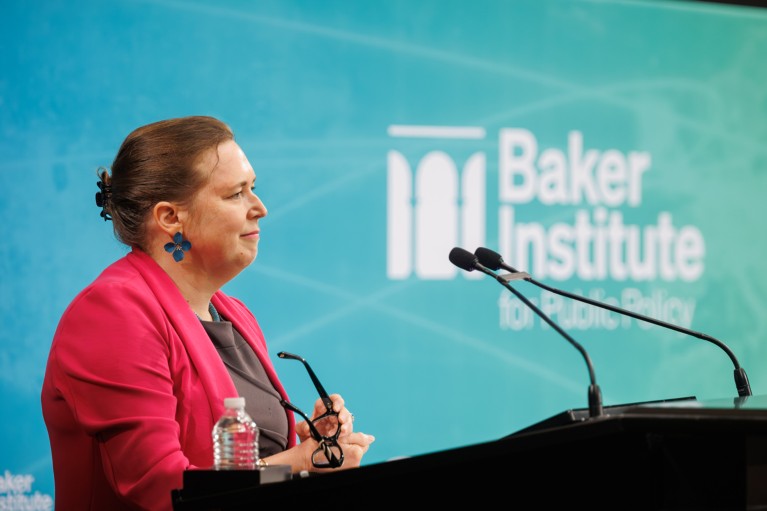
Sociologist Elaine Howard Ecklund research scientists’ attitudes in the direction of faith.Credit score: Michael Stravato
Girls and folks of color — teams that the scientific group strives to draw and retain — usually tend to establish as spiritual. “By elevating suspicion about spiritual folks, we, as scientists, could also be inadvertently maintaining racial and ethnic minorities and girls out of science,” she says.
Essop has devised a graduate educating module on the philosophy of science and “influences that may form science”. He encourages different educators and researchers to fold religious and philosophical components into tutorial discussions, as a result of he thinks an strategy to science that considers different perception techniques will nurture more-inclusive attitudes in his college students.
“We’ve obtained to take a look at more-holistic coaching,” he says, and at different techniques – comparable to Indigenous information, which has impressed “an awakening” of curiosity world wide. “We’re taking a look at science a bit in another way — that it’s not simply an absolute factor, however as an alternative we contemplate many sides.”



